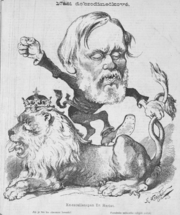Eduard Herbst

Eduard Herbst (1820–1892) was an Austrian jurist and statesman, born in Vienna. He was professor of criminal law and the philosophy of law at Prague in 1858, was elected a deputy to the Bohemian Diet, and then, in accordance with the February patent of 1861, was elected by the Diet to the Lower House on the Austrian Reichsrat, where he became one of the most conspicuous members of the German Liberal, or Constitutional, party. In 1867 he was appointed Minister of Justice in the Liberal cabinet (Bürgerministerium) of Prince Carlos Auersperg.
As such, he introduced a number of important reforms—among them the abolition of imprisonment for debt, the introduction of the jury in libel suits against the press, the organization of the district courts, important finance measures, and, above all, the confessional ordinances of 1868. In 1870 his party lost its control of the government, and he led the opposition in the Reichsrat in its attacks on the ministries of Potocki and Hohenwart, until the fall of the latter in October 1871, brought the German Constitutional party more into power, when he became a leader of the government forces in the Lower House.
In the latter years of his life, during the second cabinet of Taaffe, Herbst lost much of his former influence because of a split in his former compact party. Among his writings may be mentioned his Handbuch des österreichischen Strafrechts (seventh edition, 1882–84).
-
 This article incorporates text from a publication now in the public domain: Gilman, D. C.; Thurston, H. T.; Colby, F. M., eds. (1905). "article name needed". New International Encyclopedia (1st ed.). New York: Dodd, Mead.
This article incorporates text from a publication now in the public domain: Gilman, D. C.; Thurston, H. T.; Colby, F. M., eds. (1905). "article name needed". New International Encyclopedia (1st ed.). New York: Dodd, Mead.